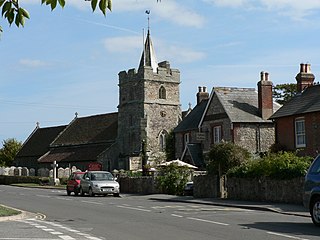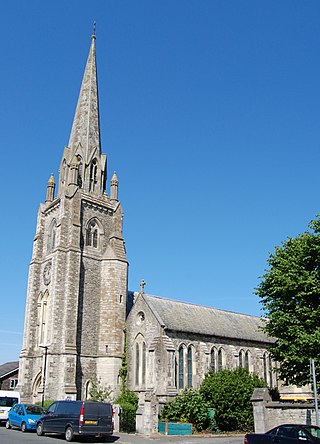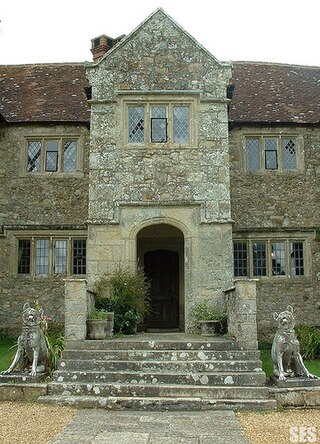
Freshwater is a large village and civil parish at the western end of the Isle of Wight, England. The southern, coastal part of the village is Freshwater Bay, named for the adjacent small cove. Freshwater sits at the western end of the region known as the Back of the Wight or the West Wight, a popular tourist area.

Arreton is a village and civil parish in the central eastern part of the Isle of Wight, England. It is about 3 miles south east of Newport.

Merstone is a hamlet on the Isle of Wight. It is home to Merston Manor, built in 1605 in the Jacobean style by Edward Cheeke, and rebuilt in the Victorian era. Merston Manor was first mentioned in the Domesday Book, and the present structure is arguably the oldest brick house on the Island. Prior to the Norman Conquest, Merston Manor was owned by the Brictuin family. The manor now belongs to the Crofts family. According to the Post Office the population of the hamlet was at the 2011 Census included in the civil parish of Arreton.

St. Mary's Church is a parish church in the Church of England located in Brighstone, Isle of Wight. The churchyard contains a memorial stone to George Albert Cairns VC.

The Church of St Nicholas in Castro, Carisbrooke is a parish church in the Church of England located in Carisbrooke, Isle of Wight.

St Mildred's Church, Whippingham is the Church of England parish church of the village of Whippingham, Isle of Wight.

All Saints' Church, Freshwater is a parish church in the Church of England located in Freshwater, Isle of Wight.

St Olave's Church, Gatcombe is a parish church in the Church of England located in Gatcombe, Isle of Wight. It is grouped with Sts Thomas Minster, Newport, St John's, Newport and St Mary's, Carisbrooke.

All Saints' Church, Godshill is a parish church in the Church of England located in Godshill, Isle of Wight.

St Peter's Church, Havenstreet is a parish church in the Church of England located in Havenstreet, Isle of Wight.

The Church of St John the Baptist, Niton is a Church of England parish church in Niton, Isle of Wight.

Holy Trinity Church is a former Church of England parish church located in the town of Ryde on the Isle of Wight. Opened in 1845, consecrated the following year and parished in 1863, it became the rapidly growing town's first parish church. A "fine, gracious" and "imposing" structure with a 134-foot (41 m) spire, it is visible for miles as a landmark at the northern end of the island, along with nearby All Saints' Church. The building has been used as a community centre since it closed for worship in 2014. Historic England has listed it at Grade II for its architectural and historical importance.

St. Peter's Church, Seaview is a parish church in the Church of England located in Seaview, Isle of Wight.

The Church of St. Mary and St. Radegund, Whitwell is a parish church in the Church of England located in Whitwell on the Isle of Wight.

Sts Thomas Minster, Newport Minster or The Minster Church of Sts Thomas, until 2008 Sts Thomas Church, is civically recognised as the main Anglican church on the Isle of Wight. Unusually, it is dedicated to both Thomas Becket and Thomas the Apostle.

St. Nicolas Church is an Anglican parish church at North Stoneham, Hampshire which originated before the 15th century and is known for its "One Hand Clock" which dates from the early 17th century, and also for various memorials to the famous.

Arreton Manor is a manor house in Arreton, Isle of Wight, England. Its history is traced to 872 AD to the time of King Alfred the Great and his parents. It was left by King Alfred by his will to his youngest son Aethelweard. Once owned by William the Conqueror, as mentioned in the Domesday Book in 1086, in the 12th century it became part of Quarr Abbey and was used by the monks for over 400 years. In 1525, it was leased to the Leigh family. The manor was rebuilt between 1595 and 1612. Built in Jacobean style, it is in the shape of a "H".

The Great Budbridge Manor is a manor house just south of Merstone, near Arreton, Isle of Wight, England. Fish ponds on the grounds appear medieval.

Percy Goddard Stonefsafriba was an English architect, author and archaeologist who worked extensively on the Isle of Wight, where he lived for most of his life. He designed and restored several churches on the island, designed war memorials and rebuilt Carisbrooke Castle. His "passion for archaeology" led him to excavate the ruins of Quarr Abbey, and as an author he wrote about the churches and antiquities of the Isle of Wight and contributed to the Victoria County History.




















